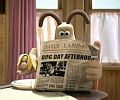| |

| Author |
Message |
|
| Syd |
 Posted: Sun Jul 10, 2016 8:59 pm Posted: Sun Jul 10, 2016 8:59 pm |
 |
|
 Site Admin
Joined: 21 May 2004
Posts: 12894
Location: Norman, Oklahoma
Site Admin
Joined: 21 May 2004
Posts: 12894
Location: Norman, Oklahoma
|
Jean Renoir's French Cancan starts off with a prolonged, mostly not-cancan dance sequence which made it hard for me to get into the film, but then it gets fun. Jean Gabin plays a cabaret owner who's going broke but gets a clever idea of selling his own club, demolishing another club, and building a new one featuring bringing back the cancan. This is about 1889 and the cancan was popular in the 1840s, so he dubs it the French Cancan. Oh, and the new club is the Moulin Rouge.*
Being a Renoir color film, it's very pretty. It has a sort of romantic hexagon which I won't try to diagram. The girls have to get in shape to do the cancan, so we get to see them practice, which is sometimes funny and sometimes wince-inducing, especially when you see them falling into splits. Good cancan dancers could kick a man's hat off his head. Clumsy ones wound up with unconscious dance partners. Evil ones wore steel-toed shoes.
In one scene, our heroine Nini goes out on the town with a prince to give him a pleasant memory to tell his grandchildren. The singer on stage at one of the clubs is Edith Piaf.
And, of course, it has to end with dancers running around the Moulin Rouge doing the cancan which looks like incredible, if exhausting, fun.
*The Gabin character is fictional, but loosely based on one of the founders of the Moulin Rouge. I suspect the romantic complications are fictional. His mistress is played by Maria Felix, who gets to belly dance. I'm not familiar with most of the cast.
This is part of a loose trilogy which also includes "The Golden Coach" and "Elena and Her Men." I've seen two of them now, so I guess I should see "Elena." |
_________________
I had a love and my love was true but I lost my love to the yabba dabba doo, --The Flintstone Lament |
|
| Back to top |
   
|
| bartist |
 Posted: Thu Jul 14, 2016 11:09 am Posted: Thu Jul 14, 2016 11:09 am |
 |
|
|
Joined: 27 Apr 2010
Posts: 6948
Location: Black Hills
|
Saw 10 Cloverfield Lane, which was an okay "locked room" plot until the stupid and ridiculous ending.* I liked both John Goodman, as the survivalist bunker weirdo, and Mary Winstead as the plucky abducted one who keeps the wheels in her head continually turning in interesting ways, trying to figure out how much of her captor's story is baloney. The first half is good, but some of the plot holes really start to fray and get ugly later on. The worst plot device is the fact that the air filtration system's manual switches can only be accessed through narrow ductwork that only Ms. Winstead can fit through. This makes less than no sense, given other information we have about the bunker. (and given common sense: this system is vital to life, and we will die if it shuts off, but hey, let's put the controls where they are nearly impossible to reach in a room that seems to have no direct interior access through, say, a door) There's also some faulty chemistry, involving a strong acid, but I'm shutting up now.
*which IIRC someone here warned me about, Syd possibly it was you. |
_________________
He was wise beyond his years, but only by a few days. |
|
| Back to top |
 
|
| billyweeds |
 Posted: Fri Jul 15, 2016 7:16 am Posted: Fri Jul 15, 2016 7:16 am |
 |
|
 Joined: 20 May 2004
Posts: 20618
Location: New York City
Joined: 20 May 2004
Posts: 20618
Location: New York City
|
I pretty much liked 10 Cloverfield Lane, though it was not nearly the scarefest I was hoping for/afraid of.
About the ending, I quite liked it because I thought there was an implicit joke being told drily. It's the ultimate "out of the frying pan" situation, and it was nailed by Winstead"s delivery of that line (I forget the exact wording) which basically meant, "I can't fucking believe this."
I hadn't considered how nonsensical the "duct" business was. You got that right for sure. |
|
|
| Back to top |
  
|
| bartist |
 Posted: Fri Jul 15, 2016 7:48 am Posted: Fri Jul 15, 2016 7:48 am |
 |
|
|
Joined: 27 Apr 2010
Posts: 6948
Location: Black Hills
|
Hi, Weeds. Yeah, I did get there might be a joke there, which does follow the horror flick template of frying pan to fire. If you roll with it, then the bit with her blowing up
an alien spaceship with a bottle of Scotch can also be good for a laugh. Maybe the swerve in tone, from the bunker ordeal, is best taken lightly. |
_________________
He was wise beyond his years, but only by a few days. |
|
| Back to top |
 
|
| yambu |
 Posted: Fri Jul 15, 2016 7:06 pm Posted: Fri Jul 15, 2016 7:06 pm |
 |
|
 Joined: 23 May 2004
Posts: 6441
Location: SF Bay Area
Joined: 23 May 2004
Posts: 6441
Location: SF Bay Area
|
10,000 Saints has the conventional list of powerful things about teens which often give me trouble in getting through films about adolescence - drugs permeating everything, including an od; insane risk taking that can ruin a movie, casual sex for the very young, piercing music that has left me behind long ago.
This is a gorgeous movie that has a group of kids all making the right choices in spite of everything. Best is the not fully wired father of one of them, who takes charge of his son after ten years. He's all love and wisdom, and it's beautiful once we and his son come to realize that. |
|
|
| Back to top |
  
|
| Syd |
 Posted: Sun Jul 17, 2016 10:46 pm Posted: Sun Jul 17, 2016 10:46 pm |
 |
|
 Site Admin
Joined: 21 May 2004
Posts: 12894
Location: Norman, Oklahoma
Site Admin
Joined: 21 May 2004
Posts: 12894
Location: Norman, Oklahoma
|
I mostly enjoyed Renoir's The Lower Depths (1936). Jean Gabin again, having problems convincing me he's Russian, but still a joy to watch. He's playing a thief (Wasska Pépel or Pépel Wasska; sources differ)who steals a Baron's gun and tries to rob the Baron, which isn't very effective because (1) the Baron is heavily in debt due to gambling and everything in the house is about to be carted off anyway (except for a wooden chair so he'll have something to sit on--a law, not kindness) and (2) he was planning to kill himself. Instead the two bond, the Baron invites Pépel to take what he wants, and Pépel is promptly arrested because nobody believes the Baron gave him a cigarette case and a (nice) bronze equestrian trophy. The Baron rescues Pépel, of course.
They eventually wind up in the the slum where Pépel's landlord and landlady are Pépel's fences and cruelly oppress and beat her younger sister Natasha. We get to see bits of how the upper and lower classes live and interact. There's a good deal of both humor and tragedy. Recommended.
Kurosawa did a version of this which I'll have to see and compare. I understand his version is much more serious and closer to Gorky's play. And set in Japan. |
_________________
I had a love and my love was true but I lost my love to the yabba dabba doo, --The Flintstone Lament |
|
| Back to top |
   
|
| gromit |
 Posted: Mon Jul 18, 2016 1:15 am Posted: Mon Jul 18, 2016 1:15 am |
 |
|
 Joined: 31 Aug 2004
Posts: 9008
Location: Shanghai
Joined: 31 Aug 2004
Posts: 9008
Location: Shanghai
|
| The edition I picked up years back had both the Kurosawa and Renoir films packaged together. My memory is a bit hazy on them, but I do recall preferring the Renoir which had more characterization and different tones, while the Kurosawa was kind of monotone and bleak. Though there is something interesting about seeing the Japanese lower classes and poverty. |
_________________
Killing your enemies, if it's done badly, increases their number. |
|
| Back to top |
  
|
| gromit |
 Posted: Wed Jul 20, 2016 11:03 am Posted: Wed Jul 20, 2016 11:03 am |
 |
|
 Joined: 31 Aug 2004
Posts: 9008
Location: Shanghai
Joined: 31 Aug 2004
Posts: 9008
Location: Shanghai
|
Back watching some films.
Walter Salles Behind the Sun (2001).
Really the Portuguese title means Broken April, and even the odd English title seems like it should really be Beneath the Sun. Oh well, it was titled Avril Blase on my (French?) edition, so I had no idea of the title or its meaning unitl i looked it up a day later.
Anyhow, I really liked Central Station, while Motorcycle Diaries didn't do much for me. Behind the Sun revolves around a blood feud between two rural families set in 1910. A minor carnival comes through looking for the nearest dusty town, and this opens up a world of new possibilities.
The film is both somewhat poetic and brutal. Salles utilizes some kinetic camerawork when someone is on a tree swing or being hunted down. I liked the young boy who narrates the film. One problem I had was that the elder brother and the carnival stunt girl are both too good-looking in a Hollywood leading actor-way. Not a fatal flaw, but a bit distracting. The landscape becomes a character as well.
Liked it. But wouldn't go out of my way for it really. A solid film.
But except for a few lovely scenes, it's rather familiar stuff.
Looking through Salles' filmog, I see he made a film on Kerouac's On The Road in 2012, with a pretty good cast. Has anyone seen that? |
_________________
Killing your enemies, if it's done badly, increases their number. |
|
| Back to top |
  
|
| gromit |
 Posted: Wed Jul 20, 2016 11:16 am Posted: Wed Jul 20, 2016 11:16 am |
 |
|
 Joined: 31 Aug 2004
Posts: 9008
Location: Shanghai
Joined: 31 Aug 2004
Posts: 9008
Location: Shanghai
|
Also watched Fassbinder's Merchant of Four Seasons. I couldn't get engaged with the stiff acting, weird pauses and emotions, and general story of people jerking each other around in minor ways. Hanna Schygulla looks great in a minor role as the sister of the titular fruit seller. She's also one of the only interesting characters, a cold type who is unafraid to speak her mind. Everyone else is a bit cartoonish. I just didn't get much out of this.
Ingrid Caven looks pretty amazing as the fruit seller's ex-girlfriend. She was married to Fassbinder at this time, and there is one amusing insider joke, where the fruit seller comes to her home and she strips naked and says they need to hurry because her husband will be coming home soon.
I also got nowhere with The Bitter Tears of Petra von Kant, also from 1972. I'm definitely more of a fan of late Fassbinder. For me his best films are Veronika Voss (1982) and In a Year with 13 Moons (1978). The latter is a bit of a tough watch, but compelling and rewarding. V Voss is imo his masterpiece. |
_________________
Killing your enemies, if it's done badly, increases their number. |
|
| Back to top |
  
|
| bartist |
 Posted: Wed Jul 20, 2016 2:19 pm Posted: Wed Jul 20, 2016 2:19 pm |
 |
|
|
Joined: 27 Apr 2010
Posts: 6948
Location: Black Hills
|
The BTs of PVk was a get-up-and-leave movie for me. I'd sit through Howard the Duck ten times before I'd take on that scheissenfest again.
Honestly can't recall if I've seen Ver. Voss, so will look for it. |
_________________
He was wise beyond his years, but only by a few days. |
|
| Back to top |
 
|
| gromit |
 Posted: Wed Jul 20, 2016 3:24 pm Posted: Wed Jul 20, 2016 3:24 pm |
 |
|
 Joined: 31 Aug 2004
Posts: 9008
Location: Shanghai
Joined: 31 Aug 2004
Posts: 9008
Location: Shanghai
|
To me, The Bitter Tears of Petra von Kant represents the excess and self-indulgence of the late 60's/early 70's. While watching it, I kept wondering what the point was. I did like some of the risque and rather 20's style dresses. And the wall mural.
In Fassbinder's evolution, it's an important film, in that he continues to use some of the avante garde staging and acting (and the one room film feels very much like a play) but now it's combined with his new-found interest in melodrama, and the emotions are cranked up pretty high here.
Apparently, Merchant of Four Seasons was Fassbinder's first film with a decent budget and made at a more deliberate pace. I believe this was the result of the success of Bitter Tears, which was made in something like a week and is all filmed in one room. |
_________________
Killing your enemies, if it's done badly, increases their number. |
|
| Back to top |
  
|
| gromit |
 Posted: Thu Jul 21, 2016 12:12 pm Posted: Thu Jul 21, 2016 12:12 pm |
 |
|
 Joined: 31 Aug 2004
Posts: 9008
Location: Shanghai
Joined: 31 Aug 2004
Posts: 9008
Location: Shanghai
|
The 1943 Phantom of the Opera is more of a romantic melodrama than horror film. They play up the opera music and its all done in Technicolor. There's a romantic rivalry which is played for comedy, as the two suitors keep showing up at the same time, often say the same thing, get caught going through doorways simultaneously, etc.
Claude Rains is the Phantom, but he's pretty sympathetic as an aging violinist trying to assist a young singer he's in love with. He loses his opera job and is in danger of eviction, as all his money goes for singing lessons for Susanna Foster. Then he goes a bit nutso and starts killing and stalking folks. The mask is grey and boring, kind of looks plasticky or almost dull metal. Not an exciting mask.
I have no idea why they have the foundations of the opera house collapse. Or why there are (sewage?) canals and a lake under the building. It's mostly a light pleasant film, filled with music. Nelson Eddy's acting bothered me, as it just seemed in a different (jokey) tone than all the others. Singing the opera parts, Eddy is quite good and in command, but somewhat hammy in the other/dialogue scenes.
I've got the 1925 Lon Chaney silent version on the same disc. So that's next up. |
Last edited by gromit on Fri Jul 22, 2016 4:38 pm; edited 1 time in total
_________________
Killing your enemies, if it's done badly, increases their number. |
|
| Back to top |
  
|
| yambu |
 Posted: Fri Jul 22, 2016 1:45 pm Posted: Fri Jul 22, 2016 1:45 pm |
 |
|
 Joined: 23 May 2004
Posts: 6441
Location: SF Bay Area
Joined: 23 May 2004
Posts: 6441
Location: SF Bay Area
|
Hijackers - Somali pirates seize a Danish commercial vessel, and immediately the ransom negotiations begin. Four months later they are still at it. The Danes fancy themselves sophisticated deal makers, but these bad guys are their match.
Meanwhile, the Danish crew must share 24 hr confinement in cramped, hot, filthy living quarters with the pirates, who are simple teens and also killers.
This is high drama realism where every scene, every word rings true. |
|
|
| Back to top |
  
|
| gromit |
 Posted: Fri Jul 22, 2016 4:56 pm Posted: Fri Jul 22, 2016 4:56 pm |
 |
|
 Joined: 31 Aug 2004
Posts: 9008
Location: Shanghai
Joined: 31 Aug 2004
Posts: 9008
Location: Shanghai
|
The 1925 Phantom of the Opera is a whole lot of fun. There's a phantom haunting the opera house, he falls for a young understudy and things spiral out of control.
While there's little to no backstory on how the phantom got this way, we do learn that the opera house was built over torture chambers (that go down 5 levels. The underground world is sort of a disturbing counterpart to the artificial opera world above. The Phantom has built trapdoors, torture rooms, a coffin bed down there. There's even boats down there, ramps down which he leads a horse, etc. And the opera stage above is filled with various creepy set decorations, which kind of make one world blend into the other. Another way the two worlds mirror each other, is that they both have a mysterious stranger, who look and act more or less alike. It's interesting that the detective looks a good deal like Lon Chaney, and only late in the film, after he's thoroughly cased the opera house, is his identity revealed.
Lon Chaney really makes the film with his wearied mannerisms, expressive hand movements, and that great make-up. The reveal of his disfigurement is just terrific, with the audience first seeing his face after the mask is removed, and the way the Phantom is horrified by the exposure, then turns to creep out Christine.
The ending seems a little tacked on, though Chaney's Phantom gets one last flourish, one last act of defiance and artifice, before mob justice rules. So much more wild and fun than the sanitized 40's version. Apparently the opera house sound stage itself became famous, sticking around for nearly a century, and used in all sorts of later films, including the 40's remake, and Hitchcock's Topaz. |
_________________
Killing your enemies, if it's done badly, increases their number. |
|
| Back to top |
  
|
| Syd |
 Posted: Mon Jul 25, 2016 10:12 pm Posted: Mon Jul 25, 2016 10:12 pm |
 |
|
 Site Admin
Joined: 21 May 2004
Posts: 12894
Location: Norman, Oklahoma
Site Admin
Joined: 21 May 2004
Posts: 12894
Location: Norman, Oklahoma
|
Antarctica: A Year on Ice. Antarctica lends itself to great documentaries. We have this, March of the Penguins, Encounters at the End of the World, Endeavour, and the brilliant oldie, With Byrd at the South Pole, not to mention the TV Series, The Last Place on Earth.
This is a film that chronicles what it's like to live in Antarctica for a year, including six months of winter when nobody comes calling and you look at the same faces day in and day out, and resent the bouncy newcomers who appear in September. The film concentrates on the people more than the environment, though there's plenty of that
One guy has to travel from McMurdo Station to Black Island to a satellite station. During the summer, he gets to take a helicopter and the journey takes ten minutes, but helicopters don't operate during the Antarctic winter. During the winter, this is at least a six-hour trip across ice partially melted and refrozen. Black Island is pretty windy. It gets hit by category 1 hurricane winds once a week during winter, category 3 winds once a month and category 5 at least once a year. Peak wind speeds have never been measured because the wind gauges keep getting blown away. Makes me glad to live in a calm, nonwindy state like Oklahoma.
And there are scenes of incredible beauty. I never got tired of looking at Mount Erebus and the smoke blowing away like a jet plane's contrail. And the aurora australis against a sky with thousands of stars and the Milky Way complete with the Coal Sack Nebula. (I think he used special cameras for this. BTW it somehow never occurred to me that in Antarctica, Orion is upside down.) But my choice for the most beautiful sight is the sun reflecting off the bottom of nacreous clouds in the days before sunrise. It's remarked that they may be related to the destruction of the ozone layer, but still they're incredible.
Herzog, of course, concentrated on the eccentricity of the denizens of McMurdo station, and, though a lot of effort goes into showing these people as being normal, you also get clues that he may have been right. People in isolation do weird things and not everybody could stand a winter in Antarctica. (Although they have internet access, thank heaven, which oddly seems to me like a form of cheating.)
Currently streaming on Netflix. Check it out.
EDIT: Though I should warn you, the director is addicted to time-lapse photography. Sometimes this does pay off, like when he pans the horizon before sunrise and sunset, or shows the aurora against the stellar background. Other times, such as when he's touring McMurdo Station, you wish someone would switch him to decaf. |
_________________
I had a love and my love was true but I lost my love to the yabba dabba doo, --The Flintstone Lament |
|
| Back to top |
   
|
|
|
All times are GMT - 5 Hours
|
|
You cannot post new topics in this forum
You cannot reply to topics in this forum
You cannot edit your posts in this forum
You cannot delete your posts in this forum
You cannot vote in polls in this forum
|
|
|


